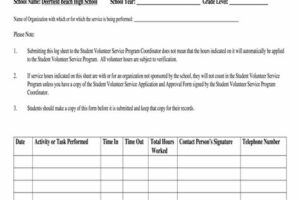Table of Contents
Volunteer work can indeed be considered as valuable employment history. Although it may not involve monetary compensation, the skills and experiences gained through volunteering are highly regarded by employers. Whether it’s assisting at a local charity or participating in community projects, volunteer work showcases dedication, teamwork, and a strong work ethic. Including volunteer experience on your resume can demonstrate your commitment to making a positive impact and enhance your chances of securing a job.
Volunteer work, often undertaken out of personal passion and a desire to make a difference, has been a cornerstone of compassionate societies for centuries. While some may question whether volunteer work truly counts as employment history, it is important to recognize the invaluable skills and experiences that can be gained from such selfless acts. Transitioning seamlessly from volunteering to a paid position can be a daunting task, but understanding the significance of volunteer work and how it contributes to one’s professional growth is imperative in today’s job market. Therefore, it becomes crucial to explore the various ways in which volunteer work can be considered as a valuable addition to an individual’s employment history.
Introduction
When it comes to building a strong resume, listing your employment history is crucial. However, many individuals wonder if volunteer work can be considered as part of their employment history. While the answer may vary depending on the specific job or industry, volunteer work can indeed count as valuable experience that can enhance your professional profile. This article explores the significance of volunteer work and how it can be effectively utilized as employment history in various contexts.
The Value of Volunteer Work
Volunteer work holds immense value, not just for the community or cause you are supporting, but also for your personal and professional growth. Engaging in volunteer activities allows you to develop a wide range of transferable skills such as communication, teamwork, problem-solving, and leadership. These experiences can be highly valuable to potential employers, demonstrating your commitment, dedication, and ability to contribute positively to a team.
Relevance to Job Applications
When applying for a job, it is essential to tailor your resume to highlight the skills and experiences that are most relevant to the position. Volunteer work can be integrated into your employment history, especially when the skills acquired align with the requirements of the job. Including volunteer work demonstrates your willingness to go above and beyond, showcasing your passion and dedication in making a difference.
Highlighting Transferable Skills
Volunteer work provides an opportunity to develop and showcase a range of transferable skills that can be beneficial in various professional settings. Skills such as project management, event planning, fundraising, and public speaking are often acquired through volunteer experiences. These skills can be emphasized in your resume and during job interviews, demonstrating your versatility and adaptability.
Professional Development
Participating in volunteer work often involves training, workshops, and networking opportunities that contribute to your professional development. These experiences can be mentioned in your employment history, highlighting your commitment to continuous learning and growth. Additionally, volunteering in a specific industry or field can provide valuable insights and connections that can enhance your chances of securing employment in that area.
Volunteer Work in Nonprofit Organizations
For individuals seeking employment in the nonprofit sector, volunteer work can be particularly valuable. Nonprofit organizations often rely heavily on volunteers, and having relevant experience in this sector showcases your understanding of its unique challenges and dedication to its mission. It also demonstrates your commitment to making a positive impact, which is highly valued in nonprofit employment.
Internships and Entry-Level Positions
When starting your career, you may encounter limited opportunities for paid employment. In such cases, internships or entry-level positions may be more readily available. However, even if these roles do not provide extensive compensation, they can still be included in your employment history to showcase your commitment and initiative. Volunteer work can be seen as a stepping stone towards gaining valuable experience and enhancing your chances of securing future paid employment.
Freelancing and Self-Employment
If you have engaged in freelance work or self-employment during periods of unemployment, volunteer work can demonstrate your ability to stay active and maintain a professional mindset. Including volunteer work can help fill any gaps in your employment history and show potential employers that you remained productive and committed to utilizing your skills during those periods.
Volunteer Work on LinkedIn
LinkedIn is a powerful platform for professional networking and showcasing your qualifications. Including volunteer work experience on your LinkedIn profile can enhance your credibility and make you stand out to potential employers. Additionally, many organizations and recruiters actively search for candidates who are passionate about giving back to the community, making your volunteer work a valuable asset in the digital professional sphere.
Conclusion
While volunteer work may not be considered traditional employment, it holds immense value in building a well-rounded professional profile. Whether you include it as part of your employment history or highlight it separately, volunteer work can demonstrate your dedication, skills, and commitment to making a positive impact on both the community and your career. Utilize the experiences gained through volunteer work to enhance your resume, showcase your transferable skills, and stand out to potential employers.
The Value of Volunteer Work on a Resume
Including volunteer work on a resume is a valuable way to showcase an applicant’s dedication, commitment, and ability to work well within a team. Recruiters often recognize the skills gained through volunteering, such as problem-solving and leadership abilities. While volunteer work may not be paid, its inclusion in the employment history section of a resume highlights the candidate’s willingness to contribute to society and make a positive impact beyond their professional duties.
Documenting Volunteer Work Experience
When documenting volunteer work experience on a resume, it is important to provide specific details about the organization, the role held, and the duration of the volunteer engagement. This information helps recruiters understand the scope and impact of the work performed. By treating volunteer work as any other job experience, candidates demonstrate their ability to take on responsibilities, meet deadlines, and contribute effectively to a team.
Highlighting Transferable Skills
Even if volunteer work is not directly related to the desired job, it offers an opportunity to showcase relevant transferable skills. Skills such as communication, project management, and organization are universally valuable and can be gained through volunteer experiences. Including these skills on a resume demonstrates the applicant’s ability to adapt and apply their abilities in different contexts, making them highly impactful additions to a resume.
Demonstrating Commitment and Passion
By including volunteer work on a resume, candidates can demonstrate their commitment and passion for a cause or community. This shows potential employers that the applicant possesses qualities such as empathy, compassion, and a desire to make a positive impact beyond their professional duties. Employers value individuals who are dedicated to something larger than themselves and are more likely to view volunteer experience as a positive attribute.
Addressing Employment Gaps
Volunteer work can be an effective way to address employment gaps on a resume. It demonstrates that the individual has been proactive during periods of unemployment and has utilized their time to gain valuable skills, contribute to society, and maintain a sense of purpose. Employers appreciate candidates who take initiative and show resilience in challenging times, and including volunteer work can help fill in gaps in employment history.
Building a Professional Network
Engaging in volunteer work often involves collaborating with people from diverse backgrounds, including professionals from various industries. Through volunteer experiences, individuals can build a professional network, opening doors to future job opportunities and introductions to potential mentors. This network can be valuable in expanding one’s professional connections and accessing hidden job markets.
Enhancing Personal and Professional Growth
Volunteer work offers numerous opportunities for personal and professional growth. Facing new challenges, working in diverse teams, and making a difference in the lives of others helps individuals develop resilience, adaptability, and leadership skills that are highly sought after by employers. Including volunteer work on a resume not only showcases these skills but also demonstrates a willingness to step outside of one’s comfort zone and take on new challenges.
References and Recommendations
Volunteering can lead to strong references and recommendations, showcasing the candidate’s character, work ethic, and dedication. Former supervisors or colleagues from volunteer positions can provide valuable insights into an applicant’s abilities and reinforce the impact they have had on an organization or community. These references and recommendations can carry significant weight in the hiring process and further validate the value of volunteer work as part of an individual’s employment history.In conclusion, volunteer work should be considered valuable employment history and included on a resume. It showcases important qualities such as dedication, commitment, and the ability to work well within a team. By documenting volunteer work experience, highlighting transferable skills, and demonstrating commitment and passion, candidates can effectively communicate the value they bring to potential employers. Volunteer work also addresses employment gaps, builds a professional network, enhances personal and professional growth, and can lead to strong references and recommendations. Overall, volunteer work is an asset that should not be overlooked when presenting one’s employment history.
Volunteer work can be a valuable addition to one’s employment history, even though it may not be considered traditional paid employment. It showcases an individual’s dedication, skills, and commitment to making a positive impact in their community or a specific cause. While it may not always be directly related to a person’s professional field, volunteer work can provide valuable experiences and transferable skills that can enhance one’s overall employability.
Here are a few reasons why volunteer work should be recognized as a valid part of an individual’s employment history:
- Transferable Skills: Volunteer work often requires individuals to develop and utilize a wide range of skills such as communication, problem-solving, teamwork, and leadership. These skills are highly transferable and can be relevant to various professional settings. Employers value candidates who possess these skills, regardless of whether they were acquired through paid work or volunteer experiences.
- Demonstrates Commitment: Engaging in volunteer work demonstrates a person’s commitment to a cause or organization. It shows that the individual is willing to go above and beyond their regular responsibilities to contribute positively to society. This dedication and passion can be seen as a desirable trait by potential employers, as it indicates a strong work ethic and a willingness to take initiative.
- Showcases Character: Volunteering often involves working with diverse groups of people and facing various challenges. It provides individuals with the opportunity to demonstrate their adaptability, empathy, and problem-solving abilities. Employers appreciate candidates who have a well-rounded character and can effectively navigate different situations, making volunteer work a valuable asset in evaluating an individual’s suitability for a professional role.
- Networking Opportunities: Volunteering allows individuals to expand their professional network and make connections outside of their regular work environment. These networking opportunities can lead to valuable recommendations, references, or even job opportunities in the future. Employers often appreciate candidates who actively engage in community service, as it demonstrates a willingness to connect with others and contribute to the greater good.
- Fills Employment Gaps: Volunteer work can also be particularly beneficial for individuals with employment gaps in their resume. It shows that the person has remained active and engaged during periods of unemployment, utilizing their skills and time productively. This can significantly enhance their employability and help address any concerns employers may have about a gap in employment history.
In conclusion, volunteer work should indeed be considered a valuable part of an individual’s employment history. It provides tangible benefits, such as transferable skills, showcases character traits, demonstrates commitment, offers networking opportunities, and helps fill employment gaps. Therefore, it is important for both individuals and employers to recognize the value and significance of volunteer experiences when evaluating a candidate’s professional profile.
Thank you for taking the time to read our blog post on whether volunteer work counts as employment history. We hope that this article has provided you with valuable insights and information on this topic. Whether you are a job seeker, an employer, or simply someone interested in volunteering, understanding the value and significance of volunteer work in the context of employment history is crucial.
Volunteer work can indeed count as employment history, especially if it is relevant to the position you are applying for. Many employers recognize the skills and experiences gained through volunteer work and appreciate the dedication and passion demonstrated by individuals who have chosen to contribute their time and efforts to a cause they care about. However, it is important to note that the way volunteer work is perceived may vary depending on the industry, the specific role, and the employer’s preferences.
When including volunteer work in your employment history, it is essential to highlight the skills and accomplishments you gained during your time as a volunteer. This could include soft skills such as communication, teamwork, leadership, and problem-solving, as well as specific technical skills related to the tasks performed during your volunteer experience. By providing concrete examples of how your volunteer work has helped you develop and hone these skills, you can effectively demonstrate your qualifications and suitability for a particular job.
In conclusion, volunteer work does count as employment history, although the weight given to it may vary depending on the circumstances. It is crucial to present your volunteer experiences in a professional and compelling manner, emphasizing the skills and achievements gained during your time as a volunteer. Remember, every experience adds value to your overall profile, and volunteer work can be a powerful asset when seeking employment opportunities. So, whether you are a recent graduate, a career changer, or someone looking to give back to the community, don’t underestimate the importance of volunteer work in shaping your employment history.
We hope this article has shed light on the significance of volunteer work in employment history and has provided you with useful guidance on how to effectively showcase your volunteer experiences. Thank you once again for visiting our blog, and we encourage you to explore more of our content for further insights on career development, job search strategies, and professional growth. Good luck on your journey towards meaningful and fulfilling employment!
.
1. Does volunteer work count as employment history?
Volunteer work can be considered part of your employment history, but it is important to note that it is typically viewed differently by employers compared to paid work experience.
When including volunteer work on your resume or job application, it is crucial to clearly state that it was a volunteer position. This helps employers understand the nature of the work and differentiate it from paid employment. However, the skills and experiences gained through volunteering can still be valuable and relevant to certain job roles.
2. Can I list volunteer work under the Work Experience section on my resume?
Yes, you can include volunteer work under the Work Experience section of your resume. Make sure to mention the organization you volunteered for, the duration of your service, and your specific responsibilities and accomplishments. By highlighting your volunteer experience alongside your paid work experience, you demonstrate your commitment to making a positive impact and showcase transferable skills.
3. How does volunteer work contribute to my overall employment history?
Volunteer work can contribute to your overall employment history by demonstrating your dedication, teamwork abilities, and willingness to contribute to your community or causes you are passionate about. While it may not carry the same weight as paid positions, it showcases your character and willingness to go above and beyond, which can be appealing to potential employers.
4. Do employers value volunteer work as much as paid work experience?
Employers generally view paid work experience as more directly relevant to job requirements. However, many employers do value volunteer work as it highlights your commitment, initiative, and ability to work well with others. It can also provide evidence of skills such as leadership, organization, and problem-solving. Including volunteer work in your employment history can make you a more well-rounded and attractive candidate.
5. How can I leverage my volunteer work during a job interview?
During a job interview, you can leverage your volunteer work by discussing specific experiences and accomplishments that are relevant to the position you are applying for. Emphasize the skills you gained or strengthened through volunteering and how they can be applied in a professional setting. By showcasing your commitment and the positive impact you made as a volunteer, you can demonstrate your potential value to the employer.






